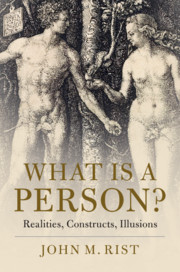Book contents
- What is a Person?
- What is a Person?
- Copyright page
- Contents
- Acknowledgments
- Introduction
- Part I Constructing the ‘Mainline Tradition’
- Part II No God, no Soul: What Person?
- Part III Toward Disabling the Person
- 15 Introducing the Five Ways
- 16 Assimilation and Homogenization
- 17 The Way of Prometheus
- 18 Whistling in the Humanitarian Wind
- 19 Virtual Morality: Propaganda as Social Glue
- 20 The Way to an Absolute Nihilism
- Part IV Persons Restored or Final Solution?
- Epilogue or Epitaph?
- Appendix The World of Rights Transformed Again
- Bibliography
- Index
19 - Virtual Morality: Propaganda as Social Glue
from Part III - Toward Disabling the Person
Published online by Cambridge University Press: 05 December 2019
- What is a Person?
- What is a Person?
- Copyright page
- Contents
- Acknowledgments
- Introduction
- Part I Constructing the ‘Mainline Tradition’
- Part II No God, no Soul: What Person?
- Part III Toward Disabling the Person
- 15 Introducing the Five Ways
- 16 Assimilation and Homogenization
- 17 The Way of Prometheus
- 18 Whistling in the Humanitarian Wind
- 19 Virtual Morality: Propaganda as Social Glue
- 20 The Way to an Absolute Nihilism
- Part IV Persons Restored or Final Solution?
- Epilogue or Epitaph?
- Appendix The World of Rights Transformed Again
- Bibliography
- Index
Summary
Ever since the possibility of atheism, or at least the denial of providence, appeared on the philosophical scene in ancient Greece, the option was available that though religion (natural or revealed) is absurd or immoral or both, it may be used mendaciously as social glue; as the best – possibly in some circumstances the only – way to ensure harmony within a political community. It can be usefully employed by bad rulers as well as good. Plato’s uncle Critias claimed that gods were ‘invented’ by a clever despot so as to act as all-seeing thought-police who would promote his own advantage. In the Republic (459cd) Plato himself is prepared to lie and deceive in the interests of the state, though insistent that lying in matters of religion is intolerable. And in the Laws (2.663d) he notes that if the wise lawgiver cannot demonstrate that the just life is more pleasant than the unjust, he would yet have to claim, for the public good, that it is. Of course, Plato himself was convinced that no right-thinking metaphysician would fail to prove the requisite philosophical point, so the need for social glue would only be relevant in a religiously- and metaphysically-cleansed society. Which society in its turn, were it to be a logically viable option, would depend on a very unplatonic account of human nature and capacity.
- Type
- Chapter
- Information
- What is a Person?Realities, Constructs, Illusions, pp. 184 - 192Publisher: Cambridge University PressPrint publication year: 2019



